新概念英语第一册 Lesson 141 Sally's first train ride 课件(共66张PPT,内嵌音频)
文档属性
| 名称 | 新概念英语第一册 Lesson 141 Sally's first train ride 课件(共66张PPT,内嵌音频) | 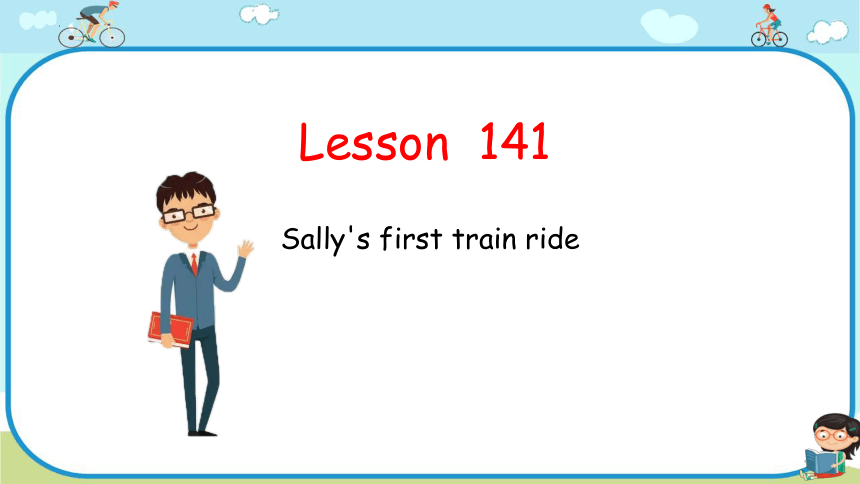 | |
| 格式 | pptx | ||
| 文件大小 | 34.6MB | ||
| 资源类型 | 教案 | ||
| 版本资源 | 新概念英语 | ||
| 科目 | 英语 | ||
| 更新时间 | 2024-08-25 08:26:01 | ||
图片预览

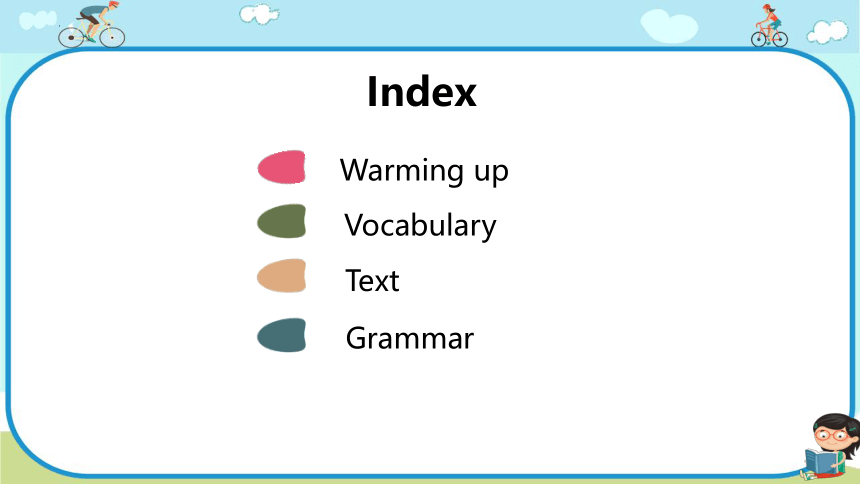
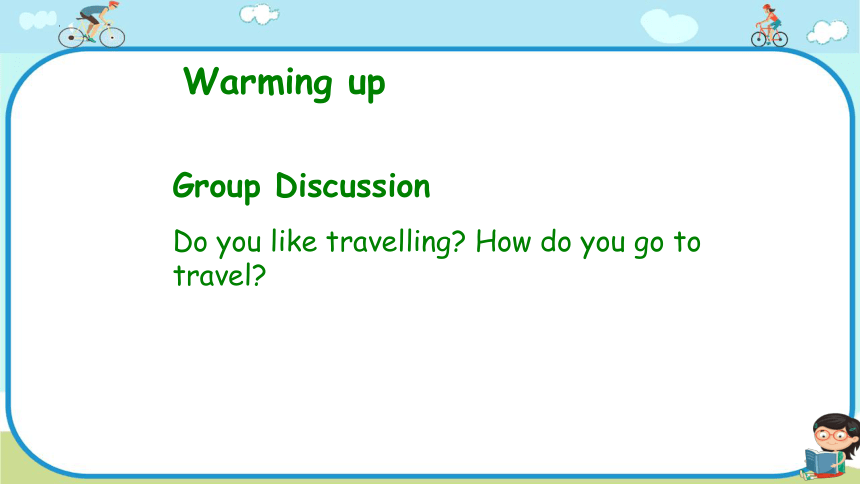
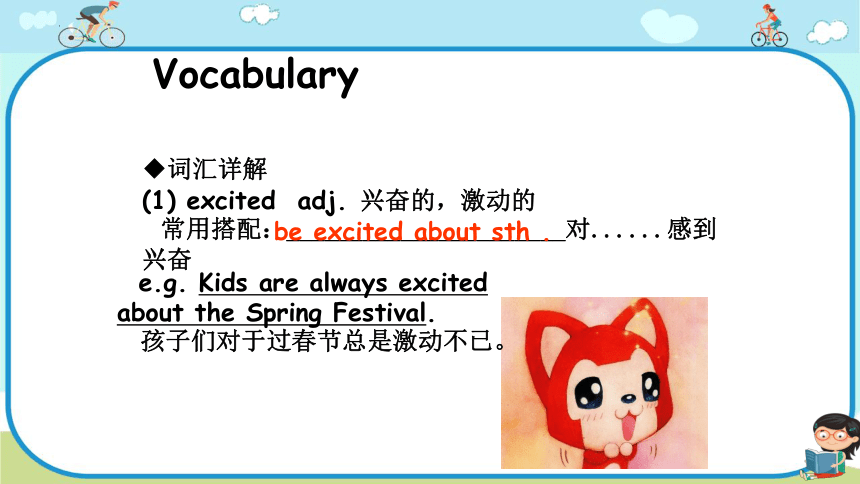
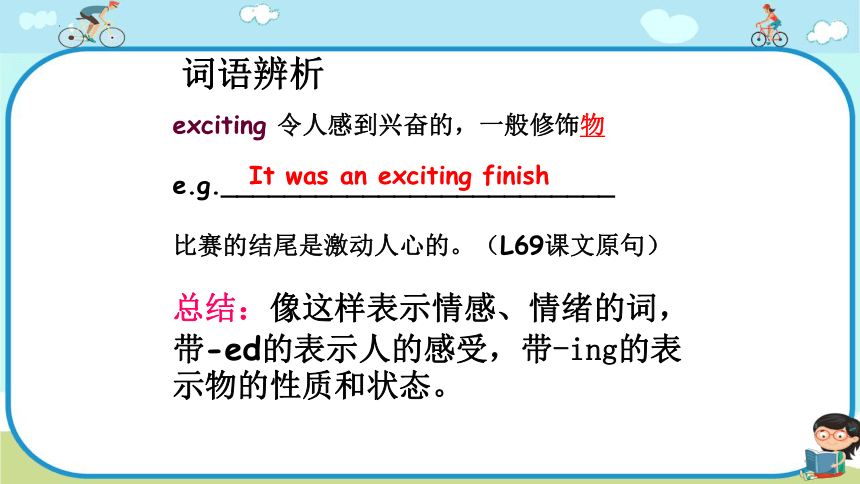
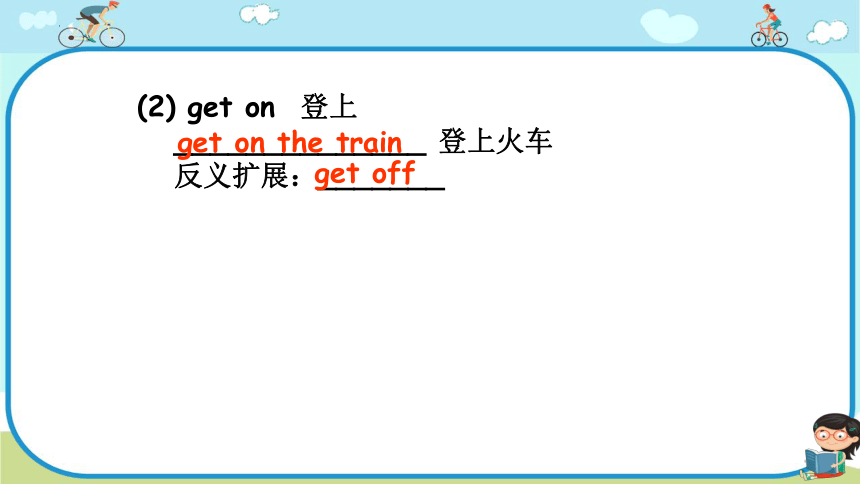
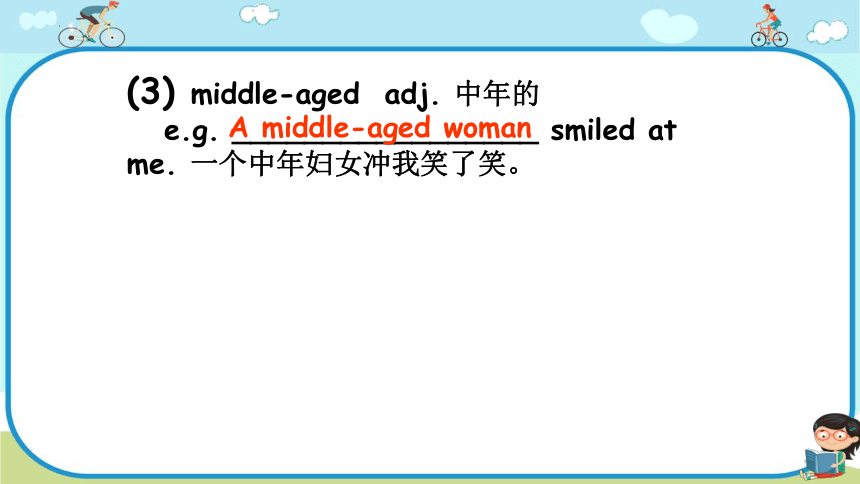
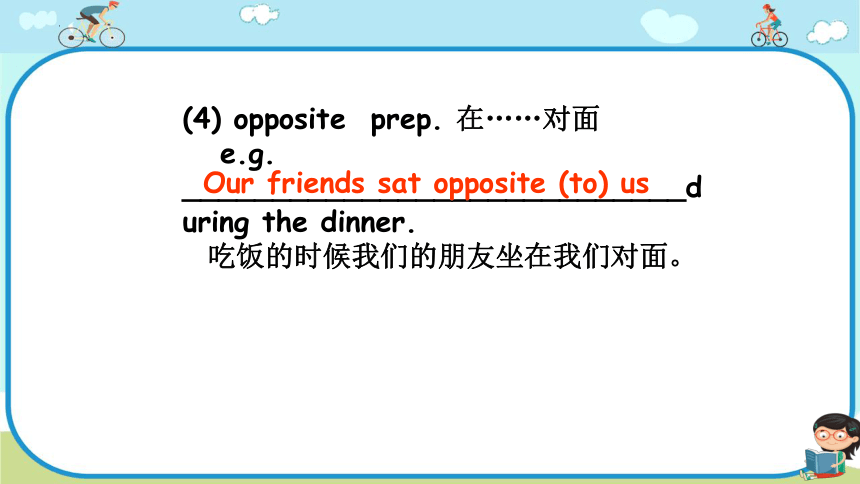
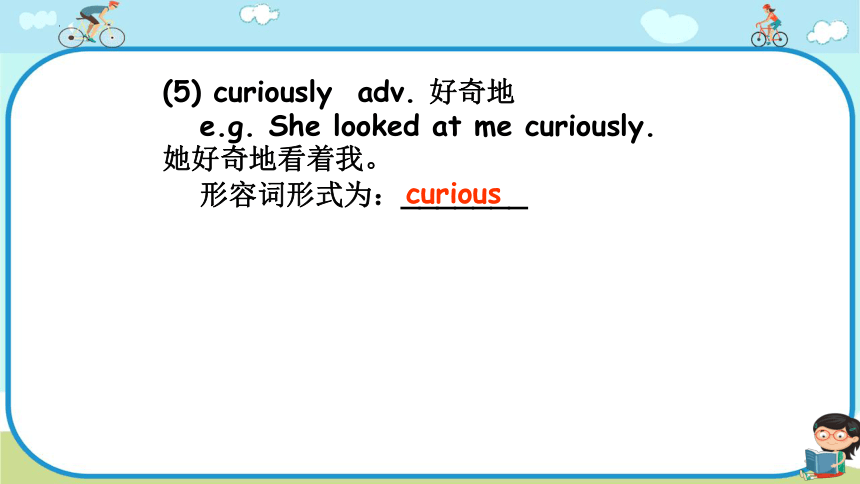
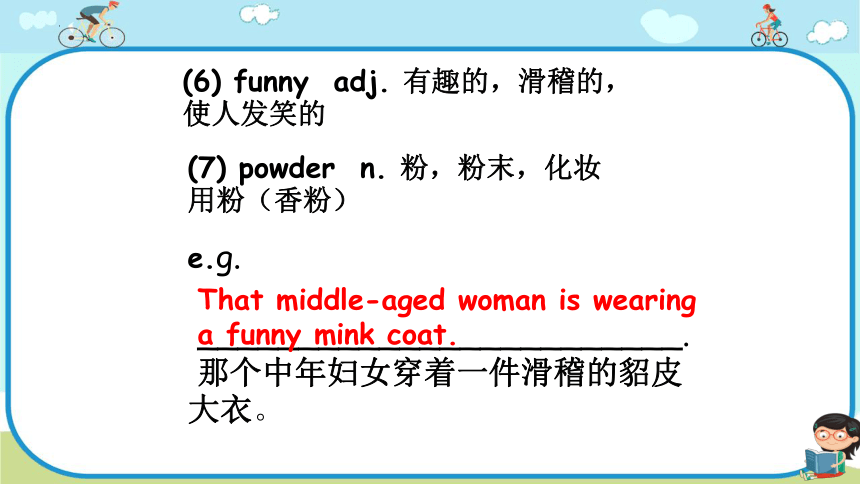
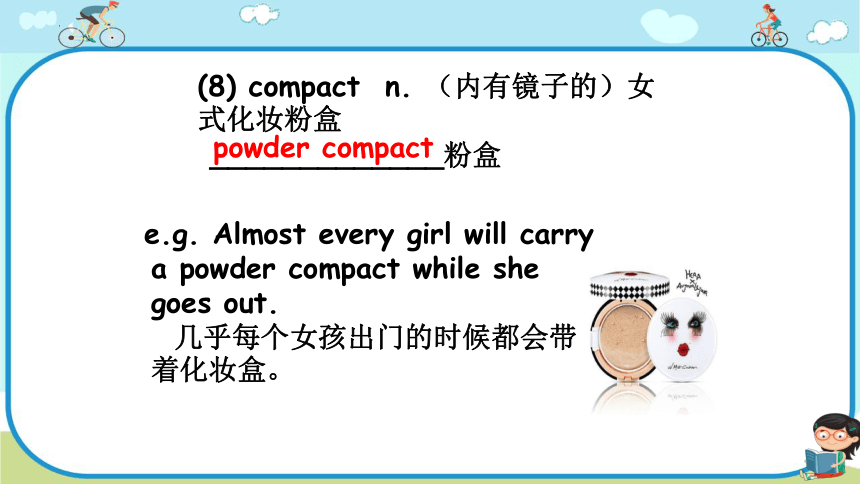
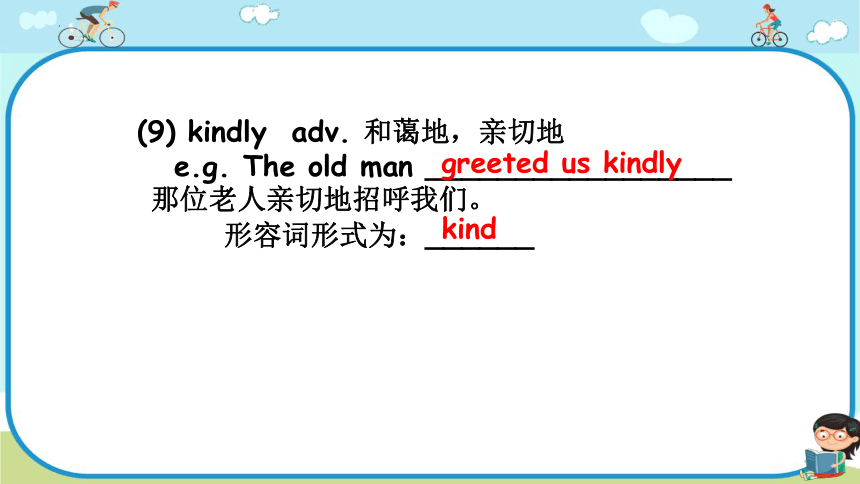
文档简介
(共66张PPT)
Lesson 141
Sally's first train ride
Index
Vocabulary
Text
Grammar
Warming up
Warming up
Group Discussion
Do you like travelling How do you go to travel
Vocabulary
◆词汇详解
(1) excited adj. 兴奋的,激动的
常用搭配:______________________对......感到兴奋
e.g. Kids are always excited about the Spring Festival.
孩子们对于过春节总是激动不已。
be excited about sth .
exciting 令人感到兴奋的,一般修饰物
e.g._________________________
比赛的结尾是激动人心的。(L69课文原句)
总结:像这样表示情感、情绪的词,带-ed的表示人的感受,带-ing的表示物的性质和状态。
词语辨析
It was an exciting finish
(2) get on 登上
______________ 登上火车
反义扩展:_______
get on the train
get off
(3) middle-aged adj. 中年的
e.g. _________________ smiled at me. 一个中年妇女冲我笑了笑。
A middle-aged woman
(4) opposite prep. 在……对面
e.g. ____________________________during the dinner.
吃饭的时候我们的朋友坐在我们对面。
Our friends sat opposite (to) us
(5) curiously adv. 好奇地
e.g. She looked at me curiously. 她好奇地看着我。
形容词形式为:_______
curious
(6) funny adj. 有趣的,滑稽的,使人发笑的
e.g.
________________________.
那个中年妇女穿着一件滑稽的貂皮大衣。
(7) powder n. 粉,粉末,化妆用粉(香粉)
That middle-aged woman is wearing a funny mink coat.
(8) compact n. (内有镜子的)女式化妆粉盒
_____________粉盒
e.g. Almost every girl will carry a powder compact while she goes out.
几乎每个女孩出门的时候都会带着化妆盒。
powder compact
(9) kindly adv. 和蔼地,亲切地
e.g. The old man _________________ 那位老人亲切地招呼我们。
形容词形式为:______
greeted us kindly
kind
(10) ugly adj. 难看的,丑陋的
e.g.Toads_________________________ 蟾蜍非常丑陋,但是很有用。
猜一猜: “丑小鸭”怎么说? ________
are very ugly, but they are very useful
ugly duckling
(11) amused adj. 被逗乐的,感到有意思的
常用搭配:______________被……逗乐
e.g. She was amused by/at the funny dog.
她被这个滑稽的狗狗给逗乐了。
be amused by/at sth.
(12) smile v. 微笑
常用搭配: ___________朝某人微笑
e.g. Look, the teacher is smiling at you. 看,老师正在对你笑呢。
smile at sb.
(13) embarrassed
adj. 尴尬的,窘迫的
e.g. He________________________________
那一刻,他感到很尴尬。
felt very embarrassed at that moment.
(14) worried adj. 担心的,焦虑的
常用搭配:be worried about sth. = worry (v.) about sth. 担心……
e.g. ________________________
她很担心自己的考试。
She is so worried about her exam.
(15) ________adv. 经常地,定期地
e.g. I visit my grandparents regularly. 我定期去看望我的祖父母。
regularly
Listen and repeat
amused [ 'mju:zd] a.有趣的
by train 坐火车
compact ['k mp kt] n.带镜的化妆盒
curiously ['kju ri sli] ad.好奇地
decide to do sth 决定做某事
embarrassed [im'b r st] a 尴尬的,窘迫的
excited [ik'saitid] a.兴奋的
funny ['f ni] a. 可笑的,滑稽的
get on 登上
kindly ['kaindli] ad.和蔼地
make up 装扮
middle-aged ['midl'eid id] a. 中年的
opposite [' p zit] prep.在……对面
powder ['paud ] n.香粉
put away 收起
ugly [' gli] a. 丑陋的
Game on!
反义词+大小声 Antonym + high voice and low voice
Purpose : to practice new words
Instruction : When teacher says 'tall' in a high voice, students should do quick response and says 'short' in a low voice; when teacher says 'fat' in a low voice, students should do quick response and says 'thin' in a high voice... Whoever fails should sing a song. Whoever says it first and right can get a score.
Materials : mouth
Participants : all students
Timing : 2-3mins
Text:
Lesson 141 Sally's first train ride
Q: Why was the mother embarassed
Learn and guess
Why was the mother embarrassed
The middle-aged lady
Sally
Sally’s mother
Read and answer
Why was the mother embarrassed
The middle-aged lady
Sally
Sally’s mother
Because Sally said the lady was ugly.
Look, read and learn
Look, read and answer
Who was invited to a children’s party
_____.
How did they go to the party
________________.
Sally
They went by train
Look, read and answer
How did Sally feel
________________.
Has she ever travelled on a train before
____________.
She was very excited
No, she hasn’t
Look, read and answer
Where did Sally sit
___________________.
What did she do
___________________________________.
She sat near the window
She asked questions about everything she saw
Look, read and answer
Who got on the train and sat opposite Sally
________________.
Did Sally answer the lady’s question
____________.
A middle-aged lady
No, she didn’t
Look, read and answer
What was the lady wearing
________________________________________.
What did she do after she took out her powder compact
________________________.
She was dressed in a blue coat and a large, funny hat
She began to make up her face
Look, read and answer
Was the lady kind or unkind
___________.
How did the mother feel
____________________.
She was kind
She was very embarrassed
Fill in the blanks
Fill in the blanks
Fill in the blanks
Translate
Translate
Translate
Translate
Translate
Translate
Role Play
课文详解
2. 数词+-year-old, 作定语,修饰其后的名词:
My ____________________is sleeping. 我那三岁的女儿正在睡觉。,
◆课文解析之经典例句
(1) Last week, my four-year-old daughter,
Sally, was invited to a children’s party.
The little girl is three years old.
l 表示年龄的说法:
1. 数词+ years old, 作表语,放在系动词后面:
小女孩三岁了。
three-year-old daughter
(2) I decided to take her by train.
l 常用表达: 决定做某事:
1.decide to do sth.
2. _______________________(L131)
3. _______________________
e.g. They decided to go there by air. 他们决定坐飞机去那儿。
make up one’s mind to do sth.
make a decision to do sth.
(3) Sally was very excited because she had never travelled on a train before.
l 常用表达:by+交通工具=on +a+交通工具
e.g. He goes to school by bike every day. 他每天骑自行车上学。
= He goes to school on a bike every day.
She went to Beijing by plane. 她乘飞机去了北京。
= She went to Beijing on a plane.
l 此句为because引导的原因状语从句
e.g. 因为他学习努力,所以他得了满分。
Because he studies hard, he gets the full marks.
(3) Sally was very excited because she had never travelled on a train before.
because 和 so 不能连用哦!
(4) Suddenly, a middle-aged lady got on the train.
常用表达:suddenly adv. ____
突然
(5) The lady was dressed in a blue coat and a large funny hat.
常用表达:be dressed in …穿戴……
e.g. __________________________
他穿了件黑色夹克。
He was dressed in a black jacket.
(6) After the train had left the station, the lady opened her handbag and took out her powder compact.
l 此句为after引导的时间状语从句,句中的过去完成时说明了动作发生的先后关系,即先发生的用过去完成时,后发生的用一般过去时。
(详情请参考Lesson119-120语法重点)
e.g. After I had finished my homework, I went to bed.
做完作业后,我去睡觉了。
(7) She then began to make up her face.
l 常用表达:make up (one’s face) 化妆,打扮
e.g. _____________________________________我妈妈每天都化妆。
l 固定搭配:begin to do sth. 开始做某事 = begin doing sth.
e.g. ____________________________after I had done my homework.
做完作业后,我开始玩电脑游戏了。
My mother makes up her face everyday.
I began to play computer games
(8) ‘Why are you doing that ’ Sally asked.
‘To make myself beautiful.’ The lady answered.
l 这里的不定式to do sth.表“_____”,意思是为了……。
e.g._____________________________________我给她买礼物是为了让她开心。
目的
I bought her a gift/present to make her happy.
(9) She put away her compact and smiled kindly.
l 常用表达:put away 把……收起,放好
e.g._____________________________. 妈妈要我把玩具收起来。
Mum asked me to put away my toys
Game on!
.你做动作我来猜 You do actions, I can guess!
Purpose : to practice phrase
Instruction : Teacher prepares some phrase cards, for example, ‘make the bed’, then asks two students to work as a team. One does actions, the other guesses. One point for each. (老师可以根据情况改变游戏形式,比如你画我猜。)
Materials : paper
Participants : some students
Timing : 7-8mins
Grammar
◆重点语法
被动语态
被动语态的构成: be动词 + 动词过去分词 (+ by + 动作的执行者)
主动语态 被动语态
一般现在时 do, does
一般过去时 did
主动语态变被动语态三步法:①原句的宾语变主语 ② 动词相应变 ( ③主语由by带) ④其余都照抄。
am/is/are done
was/were done
Passive Voice (被动语态)
We call this girl Cindy.
This girl is called Cindy.
我们叫这个女孩辛迪。
这个女孩被叫做辛迪。
主动语态
被动语态
The lights were turned off by Tom.
The windows are cleaned every week.
Millie has closed the door.
The TV was turned on.
The boy made a model plane.
All of the questions are answered.
Passive
Passive
Active
Passive
Active
Passive
Active or Passive (主动or被动)
We speak English.
主语
谓语(vt.)
宾语
English is spoken by us.
主语
谓语
宾语
主动语态和被动语态。
主动语态表示主语是动作的执行者,被动语态表示主语是动作的承受者。
汉语中常用“被”、“给”、“由”、“受”等词用来表示,
英语用: 助动词be + 及物动词的过去分词构成。
英语的谓语动词(2种)
不知道动作的执行者是谁,或没有必要指出动作的执行者时。
My bike was stolen last night.
昨晚我的自行车被偷了。
Letters are collected at eight every morning.
信件每天早晨八点收取。
The desk was made by Master Wang.
这张课桌是王师傅做的。
The bag was taken away by his sister.
那个包是她姐姐提走的。
2. 为了强调或突出动作的承受者时。
什么时候可以用被动语态?
1. We clean the classroom every day.
The classroom is cleaned by us every day.
2.They make shoes in that factory.
Shoes are made by them in that factory.
3. People plant trees in Spring.
Trees are planted by people in Spring.
4. His mother usually washes dishes after dinner.
Dishes are usually washed by his mother after dinner.
5. More and more people speak Chinese in the world.
Chinese is spoken by more and more people in the world.
对比主动与被动
Let's take a try!
What a beautiful building.
好漂亮的大楼啊。
It was built last year.
它是去年建成的。
How delicious the dinner is!
好美味的晚餐啊!
。
It was made by my Mum.
是由我妈妈做的。
( )1. Mr. Crisp takes his_____son ,Jimmy, to school every day.
A. seven year old B. seven-years-old C. seven-year-old D. seven-years old
( )2. Carol and I______to Jenny's birthday party yesterday.
A. invited B. are inviting C. were invited D. were inviting
( )3. All the children ________ to hear the good news.
A. are exciting B. excited C. are excited D. exciting
( )4. Look at that_____man,he's my uncle, Tom.
A middle aged B. middle-age C. middled age D. middle-aged
( )5. The girl who _____a blue coat is my sister.
A. is dressing in B. is dressed with C. is dressing with D. is dressed in
Read and choose
C
C
C
D
D
( )6. A:Why are you making_____your face --B: To make _____beautiful.
A. up; myself B. out; me C. up; me D.out; myself
( )7. After his mum_____ ,the baby______to cry.
A. left; is beginning B. has left; was beginning
C. had left; began D. left; began
( )8. The mistakes in my homework will ______the teacher.
A. be crossing B. be crossed by C. cross by D. cross
( )9. We_____to sing a song last night.
A. were asking B. asked C. were asked D. are asking
( )10. What you said makes me feel______.
A. to be embarrassed B. to be embarrassing
C. embarrassing D. embarrassed
Read and choose
A
C
B
C
D
Thank you!
Lesson 141
Sally's first train ride
Index
Vocabulary
Text
Grammar
Warming up
Warming up
Group Discussion
Do you like travelling How do you go to travel
Vocabulary
◆词汇详解
(1) excited adj. 兴奋的,激动的
常用搭配:______________________对......感到兴奋
e.g. Kids are always excited about the Spring Festival.
孩子们对于过春节总是激动不已。
be excited about sth .
exciting 令人感到兴奋的,一般修饰物
e.g._________________________
比赛的结尾是激动人心的。(L69课文原句)
总结:像这样表示情感、情绪的词,带-ed的表示人的感受,带-ing的表示物的性质和状态。
词语辨析
It was an exciting finish
(2) get on 登上
______________ 登上火车
反义扩展:_______
get on the train
get off
(3) middle-aged adj. 中年的
e.g. _________________ smiled at me. 一个中年妇女冲我笑了笑。
A middle-aged woman
(4) opposite prep. 在……对面
e.g. ____________________________during the dinner.
吃饭的时候我们的朋友坐在我们对面。
Our friends sat opposite (to) us
(5) curiously adv. 好奇地
e.g. She looked at me curiously. 她好奇地看着我。
形容词形式为:_______
curious
(6) funny adj. 有趣的,滑稽的,使人发笑的
e.g.
________________________.
那个中年妇女穿着一件滑稽的貂皮大衣。
(7) powder n. 粉,粉末,化妆用粉(香粉)
That middle-aged woman is wearing a funny mink coat.
(8) compact n. (内有镜子的)女式化妆粉盒
_____________粉盒
e.g. Almost every girl will carry a powder compact while she goes out.
几乎每个女孩出门的时候都会带着化妆盒。
powder compact
(9) kindly adv. 和蔼地,亲切地
e.g. The old man _________________ 那位老人亲切地招呼我们。
形容词形式为:______
greeted us kindly
kind
(10) ugly adj. 难看的,丑陋的
e.g.Toads_________________________ 蟾蜍非常丑陋,但是很有用。
猜一猜: “丑小鸭”怎么说? ________
are very ugly, but they are very useful
ugly duckling
(11) amused adj. 被逗乐的,感到有意思的
常用搭配:______________被……逗乐
e.g. She was amused by/at the funny dog.
她被这个滑稽的狗狗给逗乐了。
be amused by/at sth.
(12) smile v. 微笑
常用搭配: ___________朝某人微笑
e.g. Look, the teacher is smiling at you. 看,老师正在对你笑呢。
smile at sb.
(13) embarrassed
adj. 尴尬的,窘迫的
e.g. He________________________________
那一刻,他感到很尴尬。
felt very embarrassed at that moment.
(14) worried adj. 担心的,焦虑的
常用搭配:be worried about sth. = worry (v.) about sth. 担心……
e.g. ________________________
她很担心自己的考试。
She is so worried about her exam.
(15) ________adv. 经常地,定期地
e.g. I visit my grandparents regularly. 我定期去看望我的祖父母。
regularly
Listen and repeat
amused [ 'mju:zd] a.有趣的
by train 坐火车
compact ['k mp kt] n.带镜的化妆盒
curiously ['kju ri sli] ad.好奇地
decide to do sth 决定做某事
embarrassed [im'b r st] a 尴尬的,窘迫的
excited [ik'saitid] a.兴奋的
funny ['f ni] a. 可笑的,滑稽的
get on 登上
kindly ['kaindli] ad.和蔼地
make up 装扮
middle-aged ['midl'eid id] a. 中年的
opposite [' p zit] prep.在……对面
powder ['paud ] n.香粉
put away 收起
ugly [' gli] a. 丑陋的
Game on!
反义词+大小声 Antonym + high voice and low voice
Purpose : to practice new words
Instruction : When teacher says 'tall' in a high voice, students should do quick response and says 'short' in a low voice; when teacher says 'fat' in a low voice, students should do quick response and says 'thin' in a high voice... Whoever fails should sing a song. Whoever says it first and right can get a score.
Materials : mouth
Participants : all students
Timing : 2-3mins
Text:
Lesson 141 Sally's first train ride
Q: Why was the mother embarassed
Learn and guess
Why was the mother embarrassed
The middle-aged lady
Sally
Sally’s mother
Read and answer
Why was the mother embarrassed
The middle-aged lady
Sally
Sally’s mother
Because Sally said the lady was ugly.
Look, read and learn
Look, read and answer
Who was invited to a children’s party
_____.
How did they go to the party
________________.
Sally
They went by train
Look, read and answer
How did Sally feel
________________.
Has she ever travelled on a train before
____________.
She was very excited
No, she hasn’t
Look, read and answer
Where did Sally sit
___________________.
What did she do
___________________________________.
She sat near the window
She asked questions about everything she saw
Look, read and answer
Who got on the train and sat opposite Sally
________________.
Did Sally answer the lady’s question
____________.
A middle-aged lady
No, she didn’t
Look, read and answer
What was the lady wearing
________________________________________.
What did she do after she took out her powder compact
________________________.
She was dressed in a blue coat and a large, funny hat
She began to make up her face
Look, read and answer
Was the lady kind or unkind
___________.
How did the mother feel
____________________.
She was kind
She was very embarrassed
Fill in the blanks
Fill in the blanks
Fill in the blanks
Translate
Translate
Translate
Translate
Translate
Translate
Role Play
课文详解
2. 数词+-year-old, 作定语,修饰其后的名词:
My ____________________is sleeping. 我那三岁的女儿正在睡觉。,
◆课文解析之经典例句
(1) Last week, my four-year-old daughter,
Sally, was invited to a children’s party.
The little girl is three years old.
l 表示年龄的说法:
1. 数词+ years old, 作表语,放在系动词后面:
小女孩三岁了。
three-year-old daughter
(2) I decided to take her by train.
l 常用表达: 决定做某事:
1.decide to do sth.
2. _______________________(L131)
3. _______________________
e.g. They decided to go there by air. 他们决定坐飞机去那儿。
make up one’s mind to do sth.
make a decision to do sth.
(3) Sally was very excited because she had never travelled on a train before.
l 常用表达:by+交通工具=on +a+交通工具
e.g. He goes to school by bike every day. 他每天骑自行车上学。
= He goes to school on a bike every day.
She went to Beijing by plane. 她乘飞机去了北京。
= She went to Beijing on a plane.
l 此句为because引导的原因状语从句
e.g. 因为他学习努力,所以他得了满分。
Because he studies hard, he gets the full marks.
(3) Sally was very excited because she had never travelled on a train before.
because 和 so 不能连用哦!
(4) Suddenly, a middle-aged lady got on the train.
常用表达:suddenly adv. ____
突然
(5) The lady was dressed in a blue coat and a large funny hat.
常用表达:be dressed in …穿戴……
e.g. __________________________
他穿了件黑色夹克。
He was dressed in a black jacket.
(6) After the train had left the station, the lady opened her handbag and took out her powder compact.
l 此句为after引导的时间状语从句,句中的过去完成时说明了动作发生的先后关系,即先发生的用过去完成时,后发生的用一般过去时。
(详情请参考Lesson119-120语法重点)
e.g. After I had finished my homework, I went to bed.
做完作业后,我去睡觉了。
(7) She then began to make up her face.
l 常用表达:make up (one’s face) 化妆,打扮
e.g. _____________________________________我妈妈每天都化妆。
l 固定搭配:begin to do sth. 开始做某事 = begin doing sth.
e.g. ____________________________after I had done my homework.
做完作业后,我开始玩电脑游戏了。
My mother makes up her face everyday.
I began to play computer games
(8) ‘Why are you doing that ’ Sally asked.
‘To make myself beautiful.’ The lady answered.
l 这里的不定式to do sth.表“_____”,意思是为了……。
e.g._____________________________________我给她买礼物是为了让她开心。
目的
I bought her a gift/present to make her happy.
(9) She put away her compact and smiled kindly.
l 常用表达:put away 把……收起,放好
e.g._____________________________. 妈妈要我把玩具收起来。
Mum asked me to put away my toys
Game on!
.你做动作我来猜 You do actions, I can guess!
Purpose : to practice phrase
Instruction : Teacher prepares some phrase cards, for example, ‘make the bed’, then asks two students to work as a team. One does actions, the other guesses. One point for each. (老师可以根据情况改变游戏形式,比如你画我猜。)
Materials : paper
Participants : some students
Timing : 7-8mins
Grammar
◆重点语法
被动语态
被动语态的构成: be动词 + 动词过去分词 (+ by + 动作的执行者)
主动语态 被动语态
一般现在时 do, does
一般过去时 did
主动语态变被动语态三步法:①原句的宾语变主语 ② 动词相应变 ( ③主语由by带) ④其余都照抄。
am/is/are done
was/were done
Passive Voice (被动语态)
We call this girl Cindy.
This girl is called Cindy.
我们叫这个女孩辛迪。
这个女孩被叫做辛迪。
主动语态
被动语态
The lights were turned off by Tom.
The windows are cleaned every week.
Millie has closed the door.
The TV was turned on.
The boy made a model plane.
All of the questions are answered.
Passive
Passive
Active
Passive
Active
Passive
Active or Passive (主动or被动)
We speak English.
主语
谓语(vt.)
宾语
English is spoken by us.
主语
谓语
宾语
主动语态和被动语态。
主动语态表示主语是动作的执行者,被动语态表示主语是动作的承受者。
汉语中常用“被”、“给”、“由”、“受”等词用来表示,
英语用: 助动词be + 及物动词的过去分词构成。
英语的谓语动词(2种)
不知道动作的执行者是谁,或没有必要指出动作的执行者时。
My bike was stolen last night.
昨晚我的自行车被偷了。
Letters are collected at eight every morning.
信件每天早晨八点收取。
The desk was made by Master Wang.
这张课桌是王师傅做的。
The bag was taken away by his sister.
那个包是她姐姐提走的。
2. 为了强调或突出动作的承受者时。
什么时候可以用被动语态?
1. We clean the classroom every day.
The classroom is cleaned by us every day.
2.They make shoes in that factory.
Shoes are made by them in that factory.
3. People plant trees in Spring.
Trees are planted by people in Spring.
4. His mother usually washes dishes after dinner.
Dishes are usually washed by his mother after dinner.
5. More and more people speak Chinese in the world.
Chinese is spoken by more and more people in the world.
对比主动与被动
Let's take a try!
What a beautiful building.
好漂亮的大楼啊。
It was built last year.
它是去年建成的。
How delicious the dinner is!
好美味的晚餐啊!
。
It was made by my Mum.
是由我妈妈做的。
( )1. Mr. Crisp takes his_____son ,Jimmy, to school every day.
A. seven year old B. seven-years-old C. seven-year-old D. seven-years old
( )2. Carol and I______to Jenny's birthday party yesterday.
A. invited B. are inviting C. were invited D. were inviting
( )3. All the children ________ to hear the good news.
A. are exciting B. excited C. are excited D. exciting
( )4. Look at that_____man,he's my uncle, Tom.
A middle aged B. middle-age C. middled age D. middle-aged
( )5. The girl who _____a blue coat is my sister.
A. is dressing in B. is dressed with C. is dressing with D. is dressed in
Read and choose
C
C
C
D
D
( )6. A:Why are you making_____your face --B: To make _____beautiful.
A. up; myself B. out; me C. up; me D.out; myself
( )7. After his mum_____ ,the baby______to cry.
A. left; is beginning B. has left; was beginning
C. had left; began D. left; began
( )8. The mistakes in my homework will ______the teacher.
A. be crossing B. be crossed by C. cross by D. cross
( )9. We_____to sing a song last night.
A. were asking B. asked C. were asked D. are asking
( )10. What you said makes me feel______.
A. to be embarrassed B. to be embarrassing
C. embarrassing D. embarrassed
Read and choose
A
C
B
C
D
Thank you!
同课章节目录
